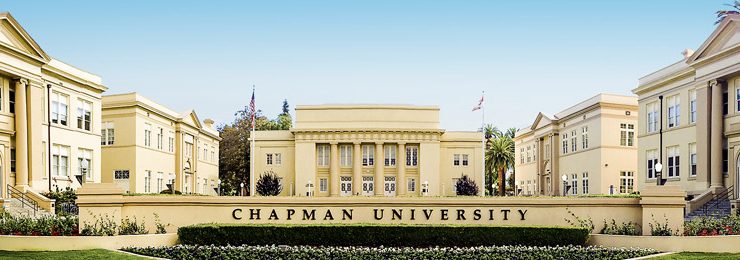
Faculty Promotion and Tenure All You Ever Wanted to Know (and Probably More)
April 10, 2020
Every spring, the Provost of Chapman University announces faculty tenure and promotion decisions. You may have heard these terms, but what do they really mean? What is “tenure”? And how do professors get “promoted?” This quick article should help answer all your questions!
What is “Tenure” and How Do Professors Earn It?
Tenure refers to the status that a college professor is granted after a probationary period early in their career. It is based on their accomplishments in the areas of research, teaching, and service. The American Association of University Professors defines tenure as “an indefinite appointment that can be terminated only for cause or under extraordinary circumstances.” So, yes, tenure is typically a career-long appointment that expires only with a professor’s decision to take a job at another institution that does not come with tenure, or misconduct (as defined in our university’s faculty manual).
Tenure is important because it safeguards a professor’s academic freedom to perform research and teach free of control from corporations, religious groups, university administrators, special interest groups, or the government. Tenure protects a professor’s rights to free inquiry, free expression, and dissent—all critical components for advancing knowledge among their students and peers (https://www.aaup.org/issues/tenure). As one School of Communication professor commented, tenure “provides me freedom and independence to critique existing knowledge, discover new knowledge, and share knowledge with my students and society.”
Full-time faculty at Chapman are hired with either “tenure track” or “non-tenure track” contracts. Only tenure track faculty are eligible for tenure review. At Chapman, the pre-tenure/probationary period is a maximum of seven years, but some faculty choose to put themselves up for tenure consideration early if their cases are particularly strong. School of Communication tenure candidates are evaluated by the Dean, a committee of all tenured School of Communication faculty, a University-wide committee with representatives from all of the schools and colleges, and finally, the Provost. The Provost, or chief academic officer of the university, makes the final decision to award or deny tenure (which is ultimately granted by the Board of Trustees).
When the tenure year arrives, the faculty member prepares a detailed electronic file that provides evidence, context, and explanation of his or her accomplishments in research, teaching, and service. When we evaluate a professor for tenure, we are not only looking at what they have already accomplished, but their future potential to be productive, high performing scholars. For tenure, the professor’s research is evaluated for its rigor, placement, impact, and frequency. In other words, is the faculty member producing a steady output of scholarship? You may have heard the phrase “publish or perish”—but it’s not quite so simple. At Chapman, we do much more than count the number of publications a faculty member has amassed. We are interested in how much impact each article has: Are other researchers citing it? Is it published in a selective, prestigious outlet with high standards? Is it part of a larger program of research that is advancing the communication field? Does it appear that this pattern of productivity will continue?
To assess the faculty member’s teaching, evaluators look at student evaluation data from each semester, peer and supervisor evaluations, the faculty member’s teaching portfolio of syllabi and sample assignments, grading practices, mentoring activity, and more. Finally, service includes committee work for the School of Communication and Chapman University, leadership in professional associations, editorial review work for academic journals and books, guest lectures and workshops, board memberships, and so on.
The entire process of applying and being reviewed for tenure takes almost one year. The Provost’s final decisions are announced in April every year.
Some people believe that tenure gives professors a license to become lazy or apathetic. This is a myth; in fact, it is completely opposite of what Chapman and the School of Communication expect of tenured faculty. With protection of employment, professors are expected to continue to participate in the life of the school, university, and academic field; to continue to engage in research and creative activity; develop and improve their teaching; stay current in theory and methods; and engage in service. Tenure allows us to be our best selves and contribute to society, including our students, in significant ways. Chapman School of Communication faculty consider tenure to be an essential privilege that carries great responsibility. And, most tenured Associate Professors are interested in eventually being considered for promotion to Full Professor.
What About Promotion?
Typically, a professor’s first promotion accompanies the granting of tenure. They move from the entry-level rank of Assistant, to Associate, Professor.
Full Professor, or simply “Professor,” is the highest academic rank. Evaluation for Full Professor typically occurs six or seven years after a faculty member achieves tenure and promotion to Associate. It involves a process just like the tenure and promotion process—but with slightly different criteria. Candidates for Professor are expected to have established a national or international reputation in their area of study that can only come with time and experience. Candidates for Professor are expected to be leaders in their area of specialization, and not just good teachers, but mentors. Full Professors have typically won prestigious awards, published extensively in selective outlets, shown consistent interest in developing their teaching skills; and been substantially engaged in the life of the school, university, and profession. They are well-known and well-respected on campus and within their field.
As you can see, our School of Communication professors work very hard! The accomplishments of tenure and promotion are not earned easily or quickly. One of the truly distinctive aspects of a Chapman education is the accessibility of our high-quality faculty. They are rewarded for getting to know their students and working with them in personalized ways—regardless of their rank or acclaim. Just as our faculty contribute to student growth, our students play a critical role in faculty professional development.
